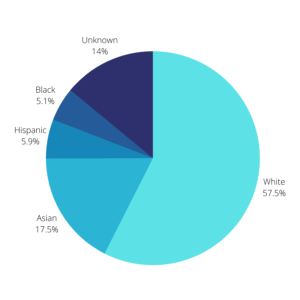“It takes humility to go into high-risk populations and communities of color if you’re an outsider,” Dr. Lim says. “Abstracting data from a medical record is complex enough, but relatively that’s straightforward compared to getting patients to share their data and to feel comfortable in doing it. Community health workers play a vital role in this level of patient engagement.”
Research and clinician teams should also be composed of diverse members. As Dr. Blanco explains, “Investigators of color can see and articulate diversity-related topics and problems from a different standpoint. Having a diverse team can then point out issues in your science, but you also hope that they can help rebuild that community trust.”

Figure 3: Self-reported demographics of active physicians in 2018. Data sourced from AAMC.
One challenge is that the medical field itself is demographically skewed. According to the Association of American Medical Colleges, in 2018, 56.2% of active physicians identified as White, 17.1% identified as Asian, 5.8% identified as Hispanic and 5.0% identified as Black or African American.4 The race for 13.7% of active physicians was unknown (Figure 3). Increasing the diversity of the medical profession could help with clinical recruitment and clinical datasets.
“The pipeline is ridiculously leaky,” Dr. Blanco says. “The likelihood that the principal investigator of the study would be somebody underrepresented in medicine or the biomedical sciences is low. We must mentor and champion fellows, particularly fellows of color. If we can give those students the support they need as they navigate our rigorous system, we will be making a difference not just in their careers but in the lives and outcomes of their patients.”
Allison Plitman, MPA, is the communications specialist for the ACR’s RISE Registry.
References
- Lim SS and Drenkard C. Understanding lupus disparities through a social determinants of health framework: The Georgians Organized Against Lupus Research Cohort. Rheum Dis Clin North Am. 2020 Nov;46(4):613-621.
- Falasinnu T, Chaichian Y, Bass MB, et al. The representation of gender and race/ethnic groups in randomized clinical trials of individuals with systemic lupus erythematosus. Curr Rheumatol Rep. 2018 Mar 17;20(4):20.
- Izadi Z, Schmajuk G, Gianfrancecso M, et al. Rheumatology Informatics System for Effectiveness (RISE) Practices See Significant Gains in Rheumatoid Arthritis Quality Measures. Arthritis Care Res (Hoboken). 2020 Sep 16:10.1002/acr.24444.
- Association of American Medical Colleges. Diversity in medicine: Facts and figures 2019. Accessed March 17, 2021.



